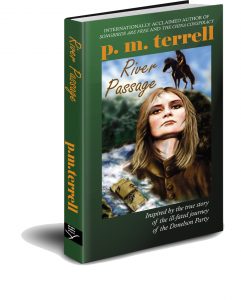A Clash of Civilizations
 2017 marks the 239th anniversary of the Donelson journey, a river journey of 300 settlers moving west to Fort Nashborough from Virginia and North Carolina. My ancestors, children and grandchildren of Ulster Irish immigrants, were among the group.
2017 marks the 239th anniversary of the Donelson journey, a river journey of 300 settlers moving west to Fort Nashborough from Virginia and North Carolina. My ancestors, children and grandchildren of Ulster Irish immigrants, were among the group.
They were actually violating the Royal Proclamation of 1763 signed by Britain’s King George III. This Proclamation used the Appalachian Mountains as a dividing line between the settlers to the east of the mountains and the Indian tribes to the west of it. It agreed that the settlers would remain out of the Indian-held territories in return for the Indians giving up their claim to lands between the mountains and the Atlantic Ocean.
Before Europeans claimed the “New World” for their respective countries, this country was as old as any other and was home to more than 500 Indian nations.
As part of the research I performed in writing River Passage, I watched 500 Nations, narrated by Kevin Costner. It was eye-opening in the complexity and sophistication of many of the tribes, some that even thought the Europeans were primitive in their habitats, culture and skills.
So when I began writing my book, I decided to write it from two perspectives: my ancestors who violated the Royal Proclamation and moved west beyond the mountains, as well as Dragging Canoe and his followers who were determined to stop their progress.
Dragging Canoe, Nipissing and Natchez by birth and Cherokee by abduction and adoption, rose to become the leader of the Chickamauga nation. It originally consisted of Cherokee but others soon joined from the Shawnee, Chickasaw and Upper Muskogee tribes. They established sites along the Tennessee River near present-day Chattanooga where they could mount attacks against the settlers moving westward by boat. Their plan was to drive the settlers back to the east of the negotiated land divide.
Many of these tribes had been in the region since the late prehistoric times. I think of this in the context of my own history: the Neely family has been in America for 296 years. How would I react if someone from another country landed on our shores and began claiming U.S. soil as their own? Yet that is precisely what Europeans did; they considered the “red man” inferior because they were different and systematically began driving them out of lands they had occupied since ancient times.
Mary Neely was 19 years old during this river journey. Her father William had moved to Fort Nashborough (now Nashville, Tennessee) after Henderson’s Purchase, an agreement between several Indian tribes (predominantly the Cherokee) and a group of white settlers in which the Indian elders sold land in present-day Middle Tennessee and parts of Kentucky. The purchase was never legitimate, as Richard Henderson was violating the Royal Proclamation and the tribal elders didn’t actually own the land they sold. (Owning land was not part of Indian culture.) It was during this land sale that Dragging Canoe left the mainstream tribe and formed the Chickamauga.
In the autumn of 1779, Mary Neely began preparing with nine brothers and sisters and her mother Margaret to join William Neely. They joined John Donelson’s party that would travel west by river. The journey was expected to take about four weeks. Instead, more than four months later, survivors of the party reached the fort with a harrowing tale of repeated Indian attacks that lasted from present-day Chattanooga past Muscle Shoals, Alabama. They also faced starvation, frostbite, white water rapids their boats were not prepared to navigate, and even small pox.
It was Mary’s friend Hannah Stuart and Hannah’s younger sister who first contracted small pox. As a result, their boat was sent to the rear to keep them from infecting the others. During one of Dragging Canoe’s attacks, the two sisters were captured and brought back to one of their villages. They infected others in the village and because the inhabitants regularly traveled between other villages, it resulted in a small pox epidemic. The two Stuart sisters died in captivity and because the tribes had no natural resistance to the disease (which had been brought to the Americas by the Europeans) they died in large numbers. This is one of the stories told in my book.
River Passage has been determined to be so historically accurate that the original manuscript is held at the Nashville Metropolitan Government Archivesfor future researchers and historians. It is a tale not only of my ancestors’ journey westward but also of the clash of two civilizations, told through the eyes of each side. It was also the winner of the 2010 Best Drama Award.
If you enjoyed The Last of the Mohicans by James Fenimore Cooper, you would enjoy River Passage and its companion book, Songbirds are Free.



